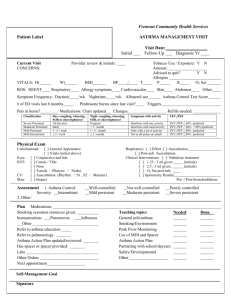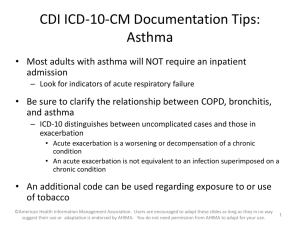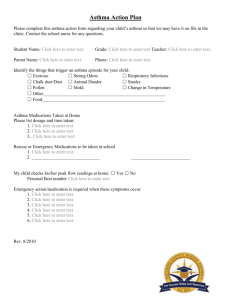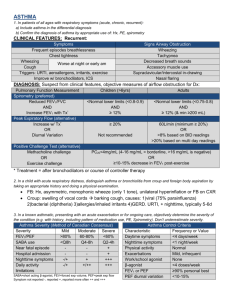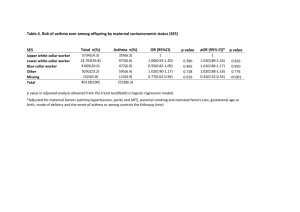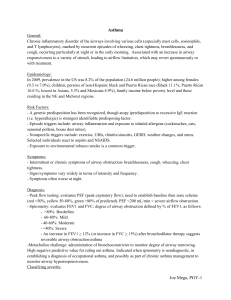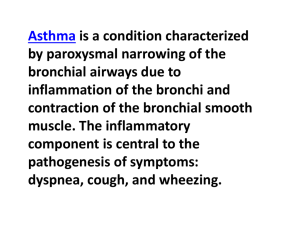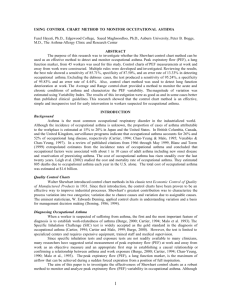CRITERIA FOR INCLUSION
advertisement
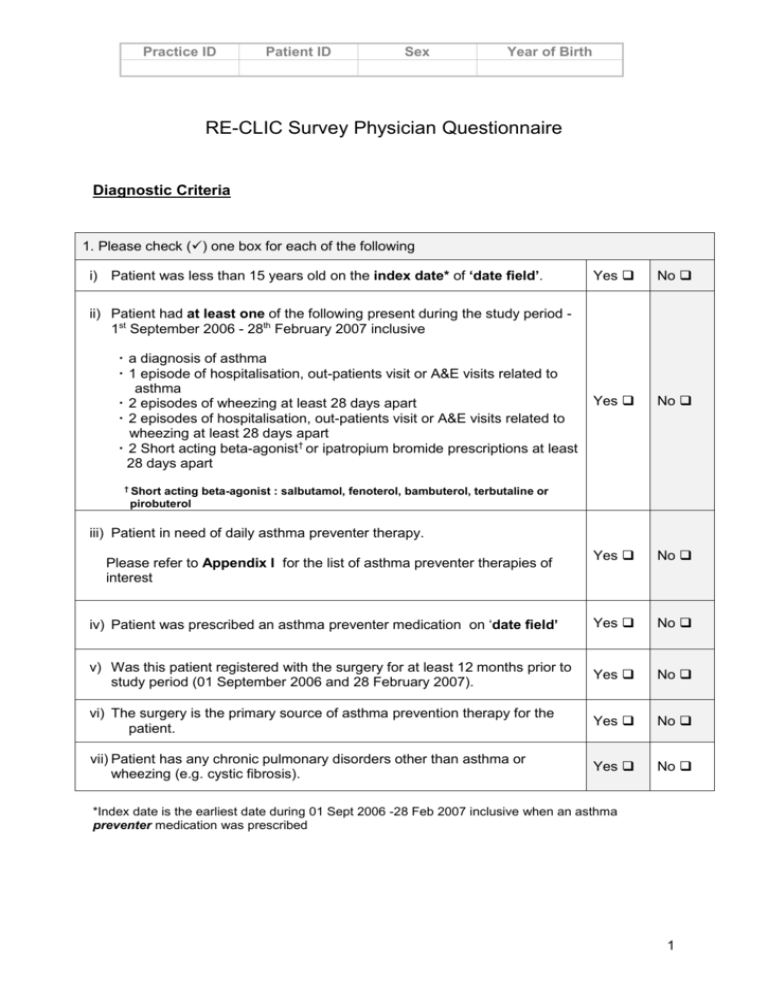
Practice ID Patient ID Sex Year of Birth RE-CLIC Survey Physician Questionnaire Diagnostic Criteria 1. Please check () one box for each of the following i) Patient was less than 15 years old on the index date* of ‘date field’. Yes No Yes No Yes No iv) Patient was prescribed an asthma preventer medication on ‘date field’ Yes No v) Was this patient registered with the surgery for at least 12 months prior to study period (01 September 2006 and 28 February 2007). Yes No vi) The surgery is the primary source of asthma prevention therapy for the patient. Yes No vii) Patient has any chronic pulmonary disorders other than asthma or wheezing (e.g. cystic fibrosis). Yes No ii) Patient had at least one of the following present during the study period 1st September 2006 - 28th February 2007 inclusive a diagnosis of asthma 1 episode of hospitalisation, out-patients visit or A&E visits related to asthma 2 episodes of wheezing at least 28 days apart 2 episodes of hospitalisation, out-patients visit or A&E visits related to wheezing at least 28 days apart 2 Short acting beta-agonist† or ipatropium bromide prescriptions at least 28 days apart † Short acting beta-agonist : salbutamol, fenoterol, bambuterol, terbutaline or pirobuterol iii) Patient in need of daily asthma preventer therapy. Please refer to Appendix I for the list of asthma preventer therapies of interest *Index date is the earliest date during 01 Sept 2006 -28 Feb 2007 inclusive when an asthma preventer medication was prescribed 1 Practice ID Patient ID Sex Year of Birth Patient Demographics and Co-morbidities 2. Please check () the appropriate box Month and year of birth ______/_____ (mm/yyyy) Gender male female Has patient ever smoked yes no If yes, is the patient currently smoking? yes no Does either of the patient’s parents/guardians currently smoke yes no 3. Has patient had any of the following background or concomitant diseases? Please check () appropriate boxes Time Period On ‘date field’ within 2 years prior to ‘date field’ Condition Yes Yes No No Allergic rhinitis/hay fever* Check one circle that best describes the type of allergic rhinitis in the patient Seasonal Perennial with seasonal exacerbations Perennial Atopic dermatitis Sinusitis Otitis media Gastro-oesophageal reflux *Symptoms of allergic rhinitis are: rhinorrhoea, nasal obstruction, nasal itching, sneezing; any required. 2 Practice ID Patient ID Sex Year of Birth ASSESSMENT OF ASTHMA SEVERITY USING ADAPTED GINA GUIDELINES 2005 Please use Appendix II to assess asthma severity according to adapted GINA guidelines. 1. Indicate the date when asthma was first diagnosed in this patient: ________________ PLEASE USE APPENDIX II FOR THE ASSESSMENT OF ASTHMA SEVERITY Severity on the ‘date field’ 2. Severity 6 mths prior to ‘date field’ Intermittent Intermittent Mild persistent Mild persistent Moderate persistent Moderate persistent Severe persistent Severe persistent 3. Indicate the most recent FEV1 available (and date of recording) in the record for this patient: between Sept 06 and Feb 07______________ (value) _______________(date in mm/yyyy) 4. Indicate the most recent PEF available (and date of recording) in the record for this patient: between Sept 06 and Feb 07______________ (value) _______________(date in mm/yyyy) ASTHMA PREVENTER TREATMENT INITIATION Indicate below all medicines that you prescribed for the patient for asthma on ‘date field’. Drug proprietary name (Brand name and presentation) Route Number of days Total Daily Dosage Dose per unit Number of units Please turn over if required 3 Practice ID Patient ID Sex Year of Birth APPENDIX I: LIST OF ASTHMA PREVENTER THERAPIES Systemic Glucocorticosteroid (Oral or Parenteral) Hydrocortisone Methylprednisolone Prednisolone Prednisone Inhaled Glucocorticosteroid Beclometasone dipropionate Budesonide Fluticasone Mometasone Furoate Ciclesonide Flunisolide Triamcinolone Acetonide Sustained Release β2-Agonist Salbutamol Terbutaline Sulphate Long acting β2-Agonist (Inhaled) Formoterol Fumarate Salmeterol Long Acting β2-agonist/ ICS combinations Budesonide & Formoterol fumarate Fluticasone & Salmeterol Sustained Release Theophylline Theophylline Aminophylline Cromones Sodium Cromoglicate Nedocromil Sodium Antileukotrienes Montelukast Zafirlukast 4 Practice ID Patient ID Sex Year of Birth Table 1: ASTHMA SEVERITY ASSESSMENT BASED ON CLINICAL FEATURES – GINA 2005 † Step 1: Intermittent Symptoms less than once a week Brief exacerbations Nocturnal symptoms not more than twice per month FEV1 or PEF >80% predicted PEF or FEV1 variability < 20% Step 2: Mild persistent Symptoms more than once per week but less than once a day Exacerbations may affect activity and sleep Nocturnal symptoms more than twice per month FEV1 or PEF >80% predicted PEF or FEV1 variability 20-30% Step 3: Moderate persistent Symptoms daily Exacerbations may affect activity and sleep Nocturnal symptoms more than once per week Daily use of short-acting ß-agonists FEV1 or PEF 60-80% predicted PEF or FEV1 variability >30% Step 4: Severe persistent Symptoms daily Exacerbations frequent Frequent nocturnal symptoms Limitation of physical activities FEV1 or PEF <60% predicted PEF or FEV1 variability >30% † Adapted from GINA 2005: Global Strategy for Asthma Management and Prevention - Updated 2005. (http://www.ginasthma.com/Guidelineitem.asp?l1=2&l2=1&intId=1169&archived=1 , Accession date 16 May 2007) 5
